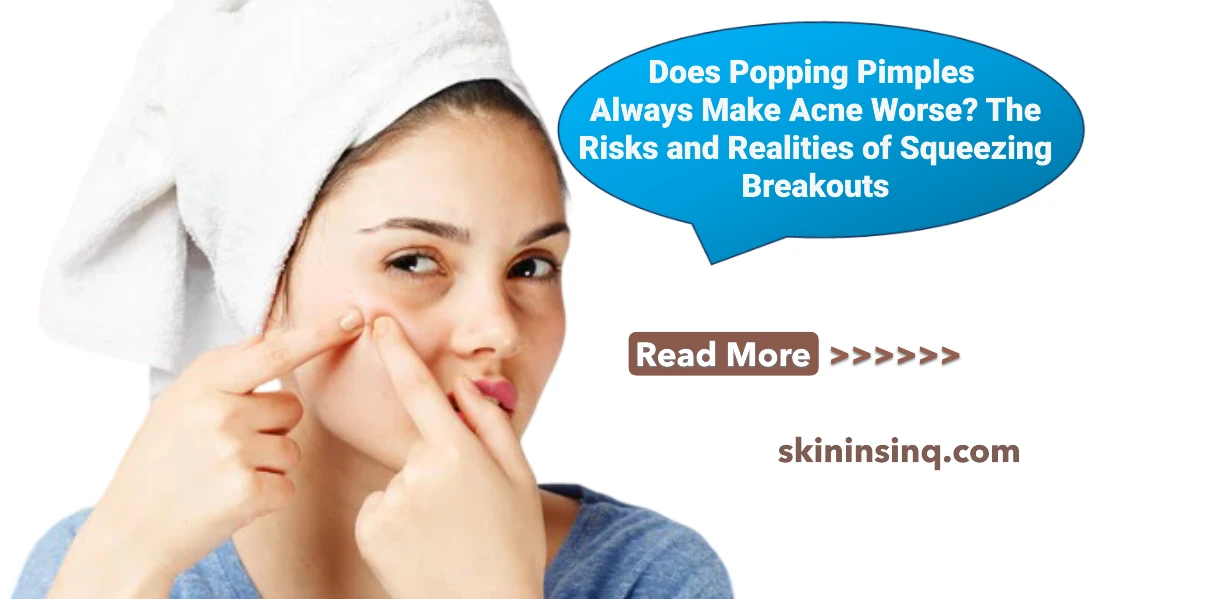Does Popping Pimples Always Make Acne Worse? The Risks and Realities of Squeezing Breakouts
Does Popping Pimples Always Make Acne Worse? The Risks and Realities of Squeezing Breakouts
Popping pimples may feel satisfying in the moment, but is it actually helpful or harmful for your skin? Many people instinctively squeeze their blemishes hoping to make them disappear faster. However, dermatologists consistently warn against this habit. So, does popping pimples always make acne worse? Let’s explore the risks and facts behind this common skincare mistake.
Why Popping Pimples Feels Tempting
It’s understandable why people pop pimples. A swollen whitehead or painful bump can be uncomfortable, embarrassing, or both. Squeezing may seem like a quick fix, especially when you want to get rid of a blemish before a big event. But while it might provide temporary relief or satisfaction, popping can lead to more serious skin problems.
What Happens When You Pop a Pimple?
When you pop a pimple, you're trying to push out the contents—mainly pus, oil, and dead skin. However, this pressure often forces bacteria and debris deeper into the skin, especially if the pimple isn't fully ready to drain. This can cause:
-
Increased inflammation
-
Deeper infection
-
New pimples forming nearby
-
Worsening of existing acne lesions
In many cases, what started as a small pimple can become a painful, inflamed cyst after improper squeezing.
The Risk of Scarring and Hyperpigmentation
One of the biggest long-term risks of popping pimples is permanent scarring. When you damage the skin by picking or squeezing, it disrupts the healing process. This can lead to:
-
Pitted or indented scars
-
Post-inflammatory hyperpigmentation (dark spots)
-
Skin texture changes
People with darker skin tones are especially prone to pigmentation changes from trauma caused by popping.
Does It Ever Help?
While dermatologists advise against self-popping, there are rare cases when a surface-level whitehead can be gently extracted safely, using sterile tools and clean hands. However, this should only be done when:
-
The pimple has a visible white tip
-
The area is disinfected
-
There is no excessive force applied
-
Hands and tools are thoroughly sanitized
Even then, it's safer and more effective to have extractions done by a licensed dermatologist or esthetician under professional conditions.
What to Do Instead of Popping
If you want to speed up the healing process without causing damage:
-
Use topical spot treatments with ingredients like salicylic acid, benzoyl peroxide, or sulfur
-
Apply a warm compress to reduce inflammation and encourage natural drainage
-
Use pimple patches to draw out impurities while preventing touching
-
Keep your skin clean and moisturized, and avoid picking at scabs
Conclusion
Popping pimples may offer short-term relief, but it usually makes acne worse in the long run. It can deepen infections, cause scarring, and prolong healing. Instead of squeezing, rely on gentle, evidence-based treatments and allow your skin to heal naturally. If you're dealing with persistent breakouts, it’s best to consult a dermatologist for safe and effective solutions.

Related Blog
Can People with Dry Skin Also Have Acne? Understanding Breakouts Beyond Oily Skin Types
Aug 2, 2025 by Admin
General Acne
What Causes Oily Skin and Can It Be Managed Naturally? Exploring Root Causes and Gentle Solutions
Aug 2, 2025 by Admin
General
Do Oily Foods Make Pimples Worse? Uncovering the Truth Behind Diet and Breakouts
Aug 2, 2025 by Admin
General Acne
Does Chocolate Cause Pimples but Not Acne? Debunking the Sweet Myth About Skin Breakouts
Aug 2, 2025 by Admin
General Acne